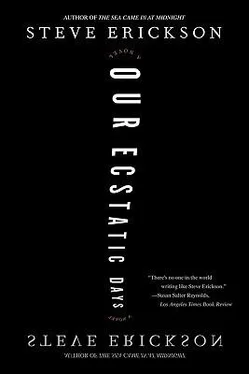is dead too, even as now I know that my own father was dead before I was
others, and utterly nonplused by either distinction, Angie has pursued her musical grail throughout Europe, the Middle East and America as the diminished skirmishes of what’s no longer called by anyone the “tribulation” but rather the Unrest have receded to the last bastions of certifiably insane Americans, Wyoming and Utah. For two years she conducts her research in lower Manhattan, for five years in the two hundred miles of desert west of formerly occupied Albuquerque, using as her headquarters an old Spanish hacienda once converted into a railroad hotel.
In wire glasses and dour attire, adopting an increasingly severe appearance in the way of women who believe no other physical identity is possible for them, Angie has neither her mother’s beauty nor her father’s handsomeness. If she did, it’s possible she wouldn’t marry anyway. But in the early ’70s, as she nears her fiftieth birthday, to her own surprise she finds herself seized by a compulsion.
This is the compulsion to adopt a child. She listens for the compulsion’s melody so she might analyze its mathematics, but all she hears is a fugue not of numbers but indecipherable runes. She pores over pictures of motherless children from all over the world, waiting for one to strike a chord. They all strike a chord. Her head fills with an awesome and heartbreaking symphony. For more than a year she wrestles with the decision, finally waking one morning in a strange ecstasy from a dream about her father; when she finally files the application, she’s stunned to be turned down, due to institutional doubts as to her “domestic stability.” Thousands of children in the world without mothers or fathers and she’s turned down? She appeals the decision and is turned down again. She applies to go to China where she might find one of the countless infant girls abandoned by their parents, but ironically is
born and it’s just as well, and in a way here in the birth canal of the lake none
denied not in spite of her Chinese heritage but because of it, as though there’s some subversiveness about it she doesn’t know. For months afterward she sits at night in her endless stream of hotel rooms poring again over the pictures of children, of sons or daughters who might have been. She runs her finger over their small faces. She holds the photos up to the light and peers into them as though some flicker in their faces, something in the backgrounds of their lives in Africa or Appalachia or the Andes, will offer clues as to why she isn’t worthy of them. Like all children who assume responsibility for their own desertion, she becomes convinced this is her punishment for leaving her errant father outside her school that morning she was a small girl when, in rags, he cried futilely for her arms in the company of the mother who cursed him.
She returns to looking for the helix. She privately despairs of ever redeeming her life with a purpose when, in the late ’80s at the far end of her career, she’s called to Los Angeles, the city that takes leave of men’s senses.
Arriving late afternoon, she asks to be taken to the site immediately but is convinced by excavation officials to rest first. She spends the night in one of the new hotels that have gone up near the old airport razed and rebuilt in the last five years after being closed more than seven decades. As dark falls, from the highrise window she can see a hesitant galaxy of lights growing across the basin, though still far less than the dazzling overturned jewel box that was night-time L.A. a century ago. The next morning, her driver explains that while the last of the freeways has finally been reopened, none takes Angie where she’s going so they make their way instead up Old La Cienega Road, one of the city’s major thoroughfares before the lake and now a narrow two-lane,
of it matters and in a way there’s nothing that matters more, and am I still
part paved and part mud. They keep the windows rolled up due to the black clouds of mosquitoes that descend suddenly from swampier parts of the city. From the backseat Angie can see the permanent watermark on warped buildings that haven’t been demolished yet, like the permanent shadows of mid-Twentieth Century Hiroshima: How long since this part has been submerged? she asks halfway across the lake bottom, and is stunned when the driver answers almost twenty years, as much by how quickly her own life is passing; it doesn’t seem so long ago she was hearing the stories about the “new L.A.” being built — as the civic phrasemakers had it—“from out of the shale,” when the lake was finally declared officially dead. “Recovery’s been slow,” she notes.
“Yes,” the driver, not wanting to venture too far into politics, answers carefully, “well … some never saw the point.” Then, becoming bolder, “After all, it’s not like there ever was supposed to be a city here in the first place. Even back before the lake,” the driver goes on, “everyone knew it was doomed.”
It’s two hours before they reach the site. As it looms into view she’s astonished at the size of it; her sixty-six-year-old heart beats harder and faster than it has in a long time. The car stops and the driver helps Angie unload from the car a large case of instruments and equipment. She’s greeted by two members of the excavation team, one of them the director of the project, a man in his early thirties with tired watery gray eyes who fairly exudes skepticism. He asks if she would like some lunch first. They’re not in a rush about this, she thinks — a battle of bureaucrats: the government wants me here, these guys don’t. She says she would like to take a look at what she’s come for but the director insists on lunch and, given how her heart is racing, she relents. Over tacos she heads off
sinking? am I still drowning? am I still descending? am I still falling down
his questions with her own, and studies in the near distance the outside scaffolding that props up part of the recovered structure. At this point, he explains, we’ve cleared almost everything but the western wall that was the most deeply embedded when that part of the hills collapsed from the water.
On a long path of planks that disappear under the complex of scaffolding, Angie, the project director and the driver with Angie’s instruments head into the site. Workers stop to watch. When she emerges into what appears to have been once a grand,now decayed lobby, the workers inside stop as well. Across the atrium, two wide stone stairways spiral up one side and the other, as well as long corridors that glint with a dead blue residue; above, much of what was the roof has been washed away. Almost immediately she hears it. It’s very faint and high, almost beyond human hearing; her ears, once extremely attuned to such sounds, aren’t as sharp as they once were. “A hotel?” she says.
“That’s what we figure,” the director answers, “hard to think it could have been anything else.” They climb the stairs and continue down one of the corridors, cutting through a small, comparatively barren room and then what might have been a sitting room beyond that, with a large window. Sodden overstuffed sofas and high-armed chairs lie overturned against the walls. In every room through which they pass, workers stop what they’re doing: She’s here, she hears them whisper, that’s her. “There are a couple of things,” the director says, “that make this site more interesting than some of the other structures we’ve excavated in the area.” As they make their way down a long corridor into a room overwhelmed by both a massive fireplace
down down? or am I rising? up up up, and how did I get turned around then?
and a melancholy Angie feels almost immediately, the music she’s heard since they entered the unearthed hotel grows. “First,” he says, “there’s no record of a hotel being here.”
Читать дальше











